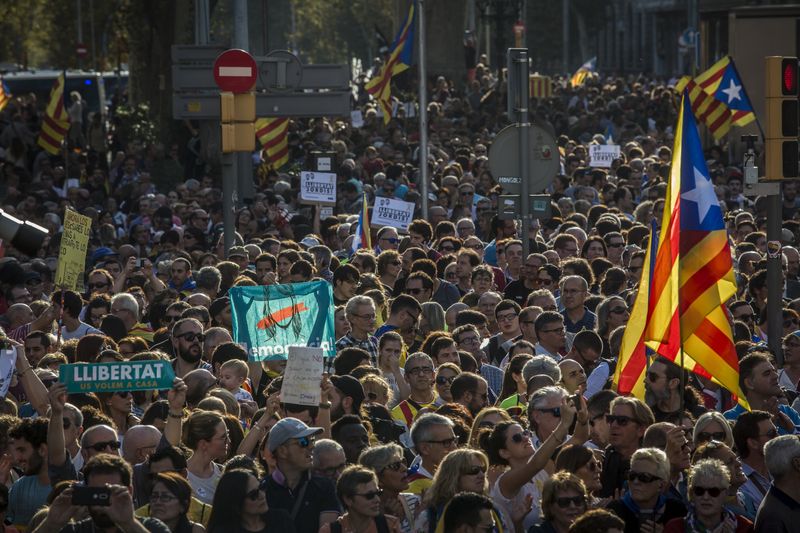Catalan Separatists Plot Response to Spain's Shock and Awe

EghtesadOnline: Catalan separatists meet Monday to craft their reply to Prime Minister Mariano Rajoy after the Spanish leader announced an unprecedented barrage of measures to stamp his authority on the rebel region.
Party leaders in the Catalan Parliament are scheduled to meet at 10:30 a.m. to discuss the timing and agenda for the chamber’s next plenary. Regional President Carles Puigdemont, set to be ousted by the Spanish government within days, wants the separatist groups who control the legislature to hold the session this week, a press officer for the regional executive said. Puigdemont has vowed to fight on, and his allies are signaling he could declare independence as soon as this week, Bloomberg reported.
Rajoy on Saturday shocked many observers with plans to clear out the entire separatist administration in Barcelona and take control of key institutions including public media and the regional police force, known as the Mossos d’Esquadra. Spain’s chief prosecutor said that if Puigdemont declares independence he would face as much as 30 years in jail and signaled that he could be arrested immediately.
The premier is trying to snuff out an independence drive that’s been gathering momentum since he took office in 2011. It’s now wounding the economy and dividing the nation. With Spain’s upper house set to give its seal of approval to his strategy by the end of this week, the focus is shifting to the mechanics of how Madrid can take charge of Catalonia’s institutions in the face of secessionist resistance.
“The big question for me, really, is how Madrid is actually going to implement its proposed actions in Catalonia,” said Caroline Gray, a lecturer in politics and Spanish at Aston University in the U.K. who specializes in nationalist movements. “Catalan government officials and many within the Mossos and Catalan media are not just going to stand down without a fight.”
The euro slipped 0.2 percent to $1.1764 amid broad gains in the U.S. dollar. Macro funds sold the European currency in early Monday trading amid concern about how the separatists will respond to Rajoy, an Asia-based trader said, asking not to be named as they’re not authorized to speak to media.
Rajoy is wielding the untested powers of Article 155 of Spain’s 1978 Constitution to try to impose central government control on Catalonia. He said he’s aiming to restore order and normality in a region that’s been flouting Spanish court rulings for the past six weeks, and to trigger regional elections within six months.
An opinion poll published by the Catalan daily El Periodico projected that a fresh election would see the separatist parties match their 48 percent showing from 2015, enough to give them a majority in the regional legislature. The survey was conducted between Oct. 16 and Oct. 19 -- before Rajoy announced his plans, but after the National Court jailed two leading separatists, angering their supporters.
Puigdemont’s challenge to Rajoy’s authority culminated in a referendum on independence held Oct. 1 that the Spanish constitutional court had declared illegal and whose validity Rajoy fiercely contests. Puigdemont claims the vote gives him a mandate to declare a Catalan republic. A crowd estimated by local police at around 450,000 joined him to protest in central Barcelona after Rajoy announced his plans.
Strained Alliances
The more force Rajoy brings to bear on the Catalans, the more strain he’s placing on the complex network of national and international alliances that underwrite his authority.
Belgian Prime Minister Charles Michel, who relies on Flemish parties with their own separatist agenda to govern, broke ranks with the rest of the European Union this month to suggest Spain consider international mediation. Spain’s Basque Nationalists, who allowed Rajoy’s minority government to pass a budget earlier this year, have abandoned the prime minister since the Catalan crisis escalated, stalling approval of next year’s spending plans and adding further uncertainty to the economic outlook.
The Basques, who also have a separatist faction to worry about, condemned the Spanish government’s decision on Saturday.
“The measure is extreme and disproportionate,” Basque regional leader Inigo Urkullu said on Twitter. “It is blowing up bridges. The Catalan government has our support to seek a constructive future.”
Jordi Turull, the Catalan government’s spokesman, said Sunday the regional parliament’s plenary session would take a decision that respects the “mandate” granted by the Oct. 1 vote.
In comments to RAC1 radio, he said Puigdemont had no plans to anticipate Rajoy’s power grab by himself calling regional elections before the Senate rubber-stamps Madrid’s deployment of Article 155. He accused Rajoy of carrying out an illegal “coup d’etat.”
The crisis poses a risk to Spain’s economy, as evidenced by the government’s decision last week to cut its growth forecast for 2018. Hundreds of Catalan companies, led by its biggest lender CaixaBank SA, are moving their registered offices to other parts of Spain to avoid costs that could stem from the region’s power struggle.


